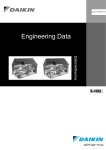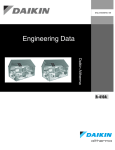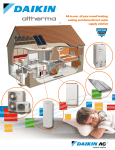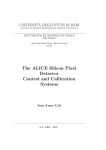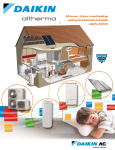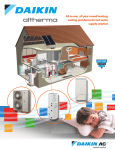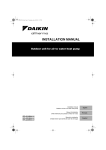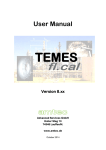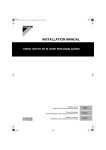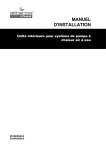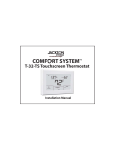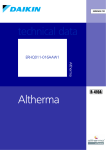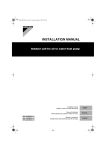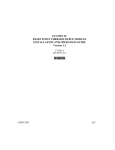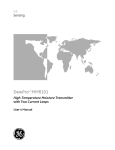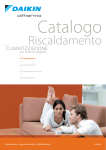Download in pdf
Transcript
Frequently Asked Questions A “3 in 1” Renewable Energy Solution For Home Heating, Cooling and Domestic Hot Water Why use a Heat Pump? Space Heating, Domestic Hot Water, and Cooling WHERE DOES IT ALL START? A heat pump only needs a heat source (the outside air), two heat exchangers (one to absorb and another one to release heat) and a relatively small amount of drive energy to keep the system going. A heat pump extracts thermal energy from the environment. In the case of Daikin Altherma the source is the outside air. The pump extracts the energy at a certain temperature, increases that temperature, and then releases it into a medium which in Daikin Altherma system is the water running to your low temperature radiators, under floor heating system or fan coil units. Between those two media the heat is moved by means of a refrigerant (R-410A). Daikin Altherma is an air-to-water heat pump system. WHY CHOOSE A HEAT PUMP? The latest energy saving and carbon reduction legislation means that there is now more emphasis than ever to reduce our reliance on fossil fuels and adopt more sustainable, renewable energy solutions. HOW DOES A HEAT PUMP WORK? 1. A heat exchanger contains refrigerant, which is colder than the outside air. As the air passes the exchanger, the refrigerant absorbs the latent heat from the outside air and evaporates. 2. The vapor passes into the compressor and is compressed, increasing its pressure and temperature, effectively concentrating the heat. 3. Hot vapor is condensed in the second heat exchanger where heat is rejected and the vapor condenses back into a liquid. The rejected heat passes into the central heating and hot water system, ready for use in the home. 4. The liquid refrigerant passes back through an expansion valve, ready to start the cycle again. WHAT IS THE MAXIMUM WATER TEMPERATURE FROM THE HEAT PUMP? 131oF (55oC) What is Daikin Altherma? WHAT IS DAIKIN ALTHERMA? Daikin Altherma is an innovative system that heats, produces domestic hot water and can even cool spaces. Daikin Altherma offers your customers maximum comfort the whole year through. WHAT IS THE LOWER OPERATION LIMIT TEMPERATURE FOR THE DAIKIN ALTHERMA SYSTEM? The guaranteed operation limit is to -4oF (-20oC) but the heat pump will continue to operate below this point. At low ambient temperatures, the backup heater generates additional heating capacity. IS THE HOT WATER FUNCTION ALWAYS INCLUDED? Yes, but you need a Daikin hot water tank to make it operational. The Daikin DHW tank option also includes a 3-way diverting valve. IS THE COOLING FUNCTION ALWAYS INCLUDED? No, the cooling function is an option available only on the reversible versions of the Hydrobox model numbers EKHBX030 and EKHBX054. and EBLQ036, 048 & 054 Monobloc. IS IT POSSIBLE TO COMBINE DAIKIN ALTHERMA WITH SOLAR THERMAL TUBES FOR DOMESTIC HOT WATER HEATING? Yes, Daikin offers an integrated solar connection kit. The Solar Kit model number: EKSOLHWAVJU. This kit includes the Digital I/O PCB model number: EKRP1HBAAU. CAN I CONNECT RADIATORS TO THE DAIKIN ALTHERMA SYSTEM EVEN THOUGH THE TEMPERATURE IS LIMITED AT 131oF (55oC)? Yes, Daikin Altherma can be connected to radiators. In many cases, old radiators that are sized for 158oF (70oC) are heavily oversized and can also be used with a water temperature of 131oF (55oC) or lower. CAN FAN COIL UNITS AND FLOOR HEATING BE COMBINED IN THE SAME SYSTEM? Yes, but the leaving water temperature must then be adjusted to match the temperature requirement for the fan coil units. The temperature in the floor loops must be reduced to a suitable level by the use of a mixing valve or shunt connection. The heat pump capacity and COP will decrease with increasing water temperatures. (Refer to Installation Instructions field setting #7 for dual set point control status) Daikin only offers a dual set point control function. With this function two set points can be generated. Depending on the required water temperature (floor heating loops and/or fan coil units are required) first set point or second set point can be activated. Daikin Altherma Considerations WHAT ARE THE DIFFERENT WAYS DAIKIN ALTHERMA CAN BE CONFIGURED? There are 3 different possible configurations for Altherma system. 1. Mono-Valent (Mild Climate): this configuration would generally be used in mild climates, where winter temp. would not fall under -4oF on a consistent basis. CAN ALTHERMA PRODUCE HOT WATER IN SUMMER? Yes, Daikin Altherma can run in hot water mode up to an ambient temperature of 95oF (35oC). The heating and cooling version alternate between hot water mode and cooling mode. At outside temperatures exceeding 95oF (35oC), hot water can still be produced using the booster heater, or through Solar if integrated to a solar thermal solution. WHAT IS THE MINIMUM WATER CONTENT OF THE SYSTEM? 2.6 gallons (10 liters) for sizes: 018-030 5.3 gallons (20 liters) for sizes: 036-054 are minimum water volume for the systems. This volume excludes the volume of the heat emitters selected. 2. Mono-Energetic (Cold Climate): a back-up electric heater is used to supplement the heat pump operation on the coldest days of the year 3. Bi-Valent (Ultra-Cold Climate): it’s configured so an external boiler can be used for the coldest months. (Must use accessory EKRP1HBAAU I/O PCB kit) WHY IS THERE A MINIMUM WATER VOLUME IN THE HYDRONIC SYSTEM? The minimum water volume is to ensure complete defrost cycles and to eliminate short cycling of the outdoor unit. This allows the system to operate efficiently and reliable. Do not include the water volume from the hydrobox in the system minimum water volume. IS THERE A NEED FOR AN ADDITIONAL BUFFER TANK TO ENSURE THAT THE WATER TEMPERATURE DOES NOT DROP DURING DEFROST? It is not necessarily required but the backup heater will provide the necessary heating capacity if the water temperature drops below 59oF (15oC). In specific applications where a buffer tank is requested, it can be implemented in the hydronic system. Daikin Altherma Considerations Operating Range Cooling Mode Outdoor Temperature oCDB 46 50 10 5 41 22 72 oC oF Leaving evaporator water temp. oFDB oCDB 95 35 32 -4 0 -20 oFDB oCDB 110 43 50 15 25 40 59 77 104 Leaving condenser water temperature 55 131 oC oF 25 50 10 32 0 5 -4 -15 -20 15 59 Booster heating operation oFDB 95 35 110 95 77 25 77 40 104 55 131 80 176 oC oF Domestic hot water tank temperature WHAT IF MY HYDRONIC CIRCUIT FLOW IS GREATER THAN THE MAXIMUM FLOW THROUGH DAIKIN ALTHERMA? A primary/secondary piping configuration will have to be used by incorporating closely spaced tees or a hydro separator. Maximum flow through the hydrobox is 15 GPM for 054 size and 11 GPM for 030 size. DO I NEED TO TREAT THE WATER IN THE HYDRONIC SYSTEM? Typically no, most municipalities meet stringent water requirements. The water used in the Daikin Altherma hydronic system should have a pH of 7 to 8, hardness below 7 grains, and chlorine below 100 gpm. These requirements also apply if antifreeze is being used. Refer to local codes. 50 122 oC oF 25 77 30 86 50 122 oC oF Leaving condenser water temp. 43 0 22 72 oCDB 77 oCDB -15 -20 5 41 Units with optional backup heater only oFDB 110 5 -4 10 Leaving evaporator water temp. oFDB 32 Pull down area Units with optional backup heater only Operating Range Cooling Mode Outdoor Temperature oFDB 115 The operating range for 018-030 is displayed in the following figure: Operating Range Domestic Water Heating Mode Outdoor Temperature Operating Range Domestic Water Heating Mode Outdoor Temperature Operating Range Cooling Mode Outdoor Temperature Operating Range Cooling Mode Outdoor Temperature WHAT IS THE DAIKIN ALTHERMA SYSTEM OPERATING RANGE? The operating range for 036-054 is displayed in the following figure: 41 5 -4 oCDB Booster heating operation Units with optional backup heater only 43 35 25 5 -15 -20 25 77 45 50 113 122 55 131 80 176 oC oF Domestic hot water tank temp. WHAT SIZE FUSES DO I NEED FOR THE OUTDOOR UNIT POWER SUPPLY? For (ERLQ) split type sizes 018-030 use 20 Amp breaker and sizes 036-054 use 30 Amp breaker. For (EBLQ & EDLQ) Monobloc type sizes 036-054 use 30 Amp breaker. Refer to the Installation Manual for instructions and conform to local code. WHEN DO I NEED TO INCLUDE BUFFER TANK INTO MY DESIGN ? With 5.3 Gallon Minimum System Volume and no Zones Activated (Buffer Tank May be required), and it is recommended to Pipe in Series to Flow through Tank. Daikin Altherma Considerations CAN I INTEGRATE A DAIKIN ALTHERMA SYSTEM TO AN EXISTING HEATING/HOT WATER SOLUTION? Yes, the Bi-Valent application is ideal for refurbishment/upgrade installations. See details in the following diagram: HOW DOES THE COMPRESSOR OPERATE IN HOT WATER MODE? The compressor starts at the highest frequency, but controls to maximize heat transfer to water. WHAT ARE THE OPERATION HEATING SUPPLY WATER TEMPERATURES FOR ALTHERMA? Typical values are: Floor heating: 86° to 95°F / 30° to 35°C Fan Coil Units: 86° to 113°F / 30° to 45°C Low temperature radiators: 104° to 122°F / 40° to 50°C WHAT IS AN INVERTER COMPRESSOR? An inverter compressor gradually increases or decreases its capacity based on the duty needed to cool down or heat up the water. CAN BOTH HEAT SOURCES OPERATE SIMULTANEOUSLY IN A BI-VALENT APPLICATION? No, only one heating solution (boiler) or Altherma can operate at a time, when using the Bi-Valent configuration. CAN I COOL THE SPACE BY USING UNDER-FLOOR COOLING? Because cool air drops and the minimum temperature for under floor cooling is 64°F/18°C (to eliminate condensate from forming), cooling the slab or floor is not an effective or it is efficient but only works in low humidity conditions. Overhead radiant cooling can be effective if utilized correctly. WHAT ARE THE BENEFITS OF INVERTER COMPRESSOR ? Longer run periods at lower capacities. Better dehumidification, fewer compressor starts mean less wear and tear on the compressor = longer life Lower compressor speeds = higher system efficiency, Higher efficiency = Lower electric bills What is a Hydrobox? WHAT IS A HYDROBOX? The hydrobox unit is the indoor part of Altherma split system range and consists of two main versions: a heating /cooling (EKHBX) version and a heating only (EKHBH) version. Both versions are delivered with an integrated backup heater for additional heating capacity during cold outdoor temperatures. The backup heater also serves as a backup in case of malfunctioning of the outdoor unit. The backup heater models are available for a heating capacity of 3 and 6 kW. The Monobloc has the hydrobox incorporated with the outdoor unit and is only available with a 6kW backup heater. Split Outdoor Type Indoor Hydrobox WHERE IS THE BACKUP HEATER LOCATED? The backup heater is inside the hydrobox. All the circulating water passes through the heat exchanger and then through the backup heater cylinder. WILL THE BACKUP HEATER ALWAYS BE SWITCHED ON? No, the backup heater will only switch ON if the heat pump cannot reach the leaving water set- point temperature within a certain time period. When the set-point is reached, the backup heater switches OFF again. CAN DAIKIN ALTHERMA BE DELIVERED WITHOUT A BACKUP HEATER? No. The backup heater must be installed to ensure that the water temperature never drops below 59oF (15oC) during startup of the system or during defrost. It can be disengaged for normal operation if needed. IS IT POSSIBLE TO UPGRADE A LOW CAPACITY BACKUP HEATER TO A LARGER CAPACITY? No. A larger capacity backup heater is not available, but 3kW and 6kW (2 stage) backup heaters are available. CAN I UPGRADE A HEATING-ONLY VERSION OF THE HYDROBOX TO A REVERSIBLE HYDROBOX WITH COOLING? No. The reversible Hydrobox has extra insulation on the pipes because of condensation. There is also a software difference between the two models CAN I CONNECT A MINI-SPLIT OUTDOOR UNIT TO A HYDROBOX? No. The RA type mini-split condensing units are not configured to operate with a Hydrobox. The PCBs in these condensing units are configured for DX operation only and do not incorporate the parameters for water heating and cooling. WHAT IS A BACKUP HEATER? The backup heater provides supplementary space heating capacity in addition to the heat pump in severe weather conditions. WHY IS THE WATER TEMPERATURE LIMITED TO 131oF (55oC) EVEN THOUGH I AM USING AN ELECTRIC BACKUP HEATER? The return water temperature to the heat pump is limited to 131oF (55oC). A return water temperature above this will activate safety devices and the compressor frequency will decrease. WHAT IS THE MAXIMUM WATER TEMPERATURE OUT OF THE BACKUP HEATER? 131oF (55oC). What is a Hydrobox? WILL THE BACKUP HEATER AND BOOSTER HEATER WORK SIMULTANEOUSLY? The backup heater is never operational in heat pump hot-water mode. Both heaters can be operational if the backup heater is running and the booster heater ON temperature is reached, or if the outdoor unit breaks down and the backup heater has to cover the entire space heating load. The simultaneous operation of the backup heater and booster can be prevented by a field setting. This needs to be changed-when field setting 4.01=0 (default or factory setting) both heaters can operate simultaneously WHAT TYPE OF EXPANSION TANK IS SUPPLIED IN THE HYDROBOX? A bladder type of 2.6 gal (10 l) volume is provided in the hydrobox and comes pre-charged at 14.5 psi (1 bar) with dry nitrogen. Nitrogen has bigger molecules than air and is less likely to penetrate through the internal bladder in the expansion. HOW MANY VERSIONS ARE AVAILABLE FOR THE HYDROBOX? Available in two versions: EKHBH for heating only, EKHBX for heating and cooling IS THERE ANY WIRING BETWEEN THE HYDROBOX AND DOMESTIC TANK? Yes. Refer to the Installation Manual. ARE THERE SEPARATE POWER SUPPLIES FOR THE ELECTRIC HEATERS AND THE OUTDOOR UNIT? Yes. Refer to the Installation Manual. IS IT POSSIBLE TO REMOTE MOUNT THE HYDROBOX INTERFACE CONTROLLER? In the installation instructions we state 1640 feet (500 m) (With a Monobloc, it is recommended to remote locate the interface controller) IS IT POSSIBLE TO INSTALL THE HYDROBOX OUTSIDE? No. The hydrobox installation location must be frostfree. Temperatures should range between 33oF (1oC) to 95oF (35oC). The hydrobox is not agency certified for outdoor installation. WHAT MATERIAL IS USED FOR THE BRAZED PLATE HEAT EXCHANGER LOCATED IN THE HYDROBOX? The braze plate heat exchanger is made of cupro-nickel material for efficient heat transfer and corrosion resistance. CAN I FLOOR-MOUNT THE HYDROBOX? No, the water, refrigerant and electrical connections are all at the bottom of the hydrobox. A minimum of 45.27 inches (1150mm) from the floor to the bottom of the hydro-box is required for access to these connections. This height requirement makes it difficult to store items on the top of the hydrobox, which could block the ventilation holes. The hydrobox is designed for wallmounted installation only. 1. 2. 3. 4. 5. 6. 7. 8. 9. 10. 11. 12. 13. 14. 15. Air purge valve Back up Heater Temperature Sensors Electrical Box Braze Plate Heat Exchanger Expansion Vessel (2.6G / 10l) User Interface Refrigerant Liquid Pipe Connection Refrigerant Gas Pipe Connection Shut Off Valves Water Inlet Connection Water Outlet Connection Drain and Fill Valves Water Filter Manometer 16. Flow Switch 17. Pump (Multi Speed) 18. Back Up Heater Thermal protector 19. Back Up Heater Thermal Fuse 20. Pressure Relief Valve 21. Pressure Relief Valve Hose What functions are on the user interface? WHAT ARE THE MAIN OPERATION FUNCTIONS ON THE CONTROLLER? The controller has several levels, and many settings are set by the installer during commissioning. The main user settings are: 1. ON/OFF 2. Space heating operation 3. Space cooling operation 4. Water heating operation 5. Silent mode operation 6. Programming Buttons 7. Timer Adjust Buttons 8. Water Temperature Adjust Buttons 9. External Control Icon WHAT IS THE SCHEDULE TIMER? The schedule timer allows the user to set the operation of the system according to a daily or weekly program. • Switch ON/OFF the installation at a scheduled time, in combination with a set-point temperature for a space heating/cooling program. • Switch ON/OFF the installation at a scheduled time for a water heating program, booster heater program, or silent mode program. CAN I USE SEPARATE ROOM THERMOSTATS AND PROGRAMMABLE TIMERS? Yes, separate controls can be used to adjust room temperatures and will notify the Daikin Altherma system when the room requires heating/cooling. Daikin Altherma will then operate to deliver the set leaving water temperature. WHAT IS THE EQUILIBRIUM POINT? It is the point at which the heat pump performance most closely matches the heating demand and no additional heat source is required. This is also known as the thermal balance point. WHAT IS THE AUTO RESTART FUNCTION? The Auto Restart function reapplies the user interface settings when the power returns after a supply failure. WHAT HAPPENS TO THE CLOCK WHEN A POWER SUPPLY FAILURE OCCURS? A power failure exceeding one hour will reset the clock. 3 4 2 5 1 9 6 8 7 WHAT HAPPENS TO THE SCHEDULE TIMER IF THE CLOCK IS RESET? The schedule timer will continue operation but the clock needs to be reset to reflect the actual time. WHICH OPERATIONAL MODE HAS PRIORITY? The system works according to the greatest temperature difference between actual water temperature and setpoint. If Daikin Altherma is running in space heating, it will immediately switch to domestic hot water if the temperature difference in the tank is larger than the temperature difference for space heating. When the system is running in hot water mode, the set-point must be reached before the system switches back to space heating mode. WHAT IS THE DIFFERENCE BETWEEN THE EQUILIBRIUM BALANCE POINT (THERMAL BALANCE POINT) AND ECONOMICAL BALANCE POINT? The thermal balance point is the outside temperature at which the amount of heating provided by Daikin Altherma equals the amount of heat lost from the house at set-point. At this point, Daikin Altherma capacity matches the full heating needs of the house. The economic balance point is the outside temperature at which the cost of heat energy supplied by Daikin Altherma equals the cost of heat supplied by a supplementary heating system. In most cases the thermal balance point will be reached long before the economic balance point on a properly working Daikin Altherma system. What functions are on the user interface? WHAT IS THE WEATHER-DEPENDENT SETPOINT AND WHEN SHOULD IT BE USED? The weather dependent set-point or sometimes called outdoor reset is when Daikin Altherma senses outside temperature and readjusts the heating system water to a minimum water temperature to satisfy the heat loss of the home. This accomplishes two major things: one it will save energy and second it creates more comfort by eliminating short cycling of Daikin Altherma at mild outdoor temperatures. During weather dependent operation, the user has the option to shift up or down the target water temperature by a maximum of 9°F (5°C). Tt Lo_Ti .09oF(.05oC) 00 Hi_Ti Shift value -.09oF(-.05oC) Lo_A Hi_A TA WHAT ARE THE BENEFITS OF A WEATHER DEPENDENT SETPOINT? The floating set-point ensures that the heat emitter temperature is never higher than necessary and this leads to the highest possible comfort level. A heat pump requires more energy input the higher the water temperature, meaning that the floating set-point also ensures the lowest possible energy consumption. WHAT HAPPENS TO THE WEATHER-DEPENDENT SETPOINT IF THE SUN SHINES OF THE TEMPERATURE SENSOR? The set-point might deviate and give a lower water temperature than is actually needed. It is recommended to install some type of sun protection above the outdoor unit. HOW DO I KNOW WHERE THE EQUILIBRIUM POINT IS? The equilibrium point is not a fixed point. The backup heater switches ON if the heat pump cannot reach the setpoint water temperature within a certain time period independently of the ambient temperature, as long as the backup heat operation is not disabled by the field setting. Derived from system selection CAN THE TEMPERATURE SENSOR THAT IS USED TO DETERMINE THE WEATHER-DEPENDENT SETPONT BE MOUNTED REMOTELY FROM THE OUTDOOR UNIT? No. The sensor is calibrated to a certain resistance and changing the wire length impacts this calibration. WHAT IS A WEATHER-DEPENDENT SETPOINT (OUTDOOR RESET)? When the weather-dependent set-point functionality is enabled, the set-point for the leaving water temperature will be dependent upon the outside ambient temperature. At low outside ambient temperatures, the leaving water temperature increases to satisfy the increasing heating requirement of the building. At warmer temperatures, the leaving water temperature decreases to save energy. CAN I USE THE WEATHER-DEPENDENT SETPOINT IF I INSTALL MY OUTDOOR UNIT IN A GARAGE THAT IS WARMER THAN THE AMBIENT OUTDOOR TEMPERATURE? No, the floating set-point is dependent on the temperature sensor in the outdoor unit. If the outdoor unit is installed in a warm place, a fixed set-point temperature must be used. DO I HAVE TO USE A ROOM THERMOSTAT CONNECTED TO THE HYDROBOX? Even though Daikin Altherma operates without an external thermostat, Daikin highly recommends this feature to be included. This will prevent excessive space heating and save energy since the system will stop operating when the room temperature has the thermostat set point. DO I HAVE TO USE A DAIKIN THERMOSTAT? It is also recommended to use a Daikin thermostat. The control logic of the Daikin thermostat matches Daikin Altherma for enhanced reliability. If a third party thermostat is used, it must be capable of setting the heating minimum run-time of six (6) minutes. Thermostats with minimal heating run times are not readily available and may be difficult to source. Domestic Hot Water WHY DOESN’T THE BOOSTER HEATER SWITCH ON IMMEDIATELY WHEN THERE IS A REQUEST FOR HOT WATER? It is desirable to let the heat pump cover as much of the hot water production load as possible with high COP. The booster heater delay ensures that the booster heater is not used more than necessary. WILL I STILL HAVE SUFFICIENT CAPACITY OF HOT WATER EVEN IF THE HEAT PUMP OR BOOSTER HEATER DOES NOT SWITCH TO HOT WATER MODE IMMEDIATELY? Yes. Daikin Altherma is not based on instant water heating like a gas boiler. The tank has a storage volume of 50 or 80 gallons (200 or 300 liters) of hot water that covers the load while the system switches to hot water mode. WHY IS THE DHW TANK HEAT EXCHANGER VOLUME AND SURFACE AREA SMALLER THAN TYPICAL INDIRECT WATER HEATERS? The heat exchanger is designed to optimize heat transfer for both heat pump and solar operation and takes into account Daikin inverter compressor technology allowing higher heat pump capacities at lower outdoor ambient conditions. The DHW tank heat exchanger volume is 1.8 gal/6.8 l and surface area is 15.6 ft2/1.45 m2. WHAT MATERIAL IS USED FOR THE DHW TANK? DHW tank is stainless steel 316L. The DHW tank uses 1.57 inch (40mm) thick polyurethane foam insulation which keeps standby heat losses to a maximum of 0.5°F/0.3°C per hour. WHAT ARE THE DHW RECOVERY CHARACTERISTICS? On average, 55 minutes without booster heater. See chart below for details (recovery times based on 80°F/44.5°C ΔT): Daikin Altherma DHW Recovery Times (minutes) Recovery Times (minutes) Capacity BTUH 50 gal (220 L) 80 gal (300 L) (018) 18,000 111 178 (024) 24,000 83 133 (030) 30,000 67 107 (036) 36,000 56 89 (048) 48,000 42 67 (054) 54,000 37 59 Recovery times based on 80°F/44.5°C Δ T Booster heater delay default setting is minimum 20 minutes (Maximum is 95 minutes) CAN I INTEGRATE DAIKIN ALTHERMA DHW WITH SOLAR COLLECTOR? The solar kit integrates the field-supplied solar thermal panels with the pump station and domestic hot water tank. The solar kit provides the transfer of solar heat to the Daikin Altherma hot water tank via an external heat exchanger. In contrast to tanks with two heat exchangers, this system allows the entire content of the tank to be efficiently heated with solar heat and, if necessary, with heat pump energy. CAN I USE A THIRD PARTY DHW TANK INSTEAD OF THE DAIKIN ALTHERMA DHW TANK? Yes, a third party tank can be used for increased storage capacity and where double wall heat exchangers are required. (Refer to the Engineering Data book for third party DHW tank kit information) EKSOLH solar kit EKHWS Hot water tank Installation Considerations ARE THERE ANY REFRIGERANT PIPING LIMITATIONS? Yes, see following list: REQUIREMENT 018-030 036-054 Maximum allowable refrigerant piping length between outdoor unit and indoor unit. 98.4 ft. (30 m) 246 ft. (75 m) Minimum required refrigerant piping length between outdoor unit and indoor unit. 9.8 ft.(a) (3 m) 9.8 ft.(a) (3 m) Maximum allowable height difference between outdoor unit and indoor unit. 65.6 ft. (20 m) 98.4 ft. (30 m) Maximum allowable distance between the 3way valve and the indoor unit (only for installations with domestic hot water tank). 10 ft. (3 m) 10 ft. (3 m) Maximum allowable distance between the domestic hot water tank and the indoor unit (only for installations with domestic hot water tanks). The thermistor cable supplied with the domestic hot water thank is 39.4 ft. (12 m) in length. 32.8 ft. (10 m) 32.8 ft. (10 m) (a) When <16.4 ft. (<5 m), recharging of the outdoor unit is required. Refer to the installation manual of the outdoor unit. WHAT CONSIDERATIONS DO I NEED TO TAKE WHEN SIZING THE HYDRONIC PIPING? Select piping diameter in relation to required water flow and available ESP of the pump. See following example: ARE THERE ADDITIONAL INSTALLATION REQUIREMENTS? It is sometimes necessary to install an oil trap per the following information: INSTALLATION REQUIREMENTS Since there is a possibility of oil held inside the riser piping flowing back into the compressor when stopped and causing liquid compression phenomenon. Installed trap required at each difference in height of 32.8 ft. (10 m). *Trap installation spacing: A Outdoor unit B Indoor unit C Gas piping D Liquid piping E Oil trap Oil trap is not necessary when the outdoor unit is installed in a higher position than the indoor unit. CAUTION: TRAP REQUIRED FOR ERLQ036, 048, 054 MODELS ONLY All refrigerant piping must be insulated along its full run using a minimum of 1/2” wall thickness insulation (e.g. Armaflex®). It is recommended to use a minimum 3/4” wall thickness insulation when running refrigerant piping through unconditioned spaces (attics, garages, crawl spaces and outdoors). (Refer to local codes). Note that: 1. Refrigerant gas and liquid piping should not be insulated together. 2. All joint areas must also be fully insulated. WHAT IS A DIFFERENTIAL BYPASS VALVE ? It is a valve, which opens and closes automatically in response to motorized zone valves opening and closing, to dissipate the head pressure produced by a heating circulating pump. (018-030) Water flow rate for Hydrobox: Min (030): 3.2 gpm Max (030): 11.1 gpm (feet of head = psi x 2.31) (036-054) Min (054): 4.2 gpm Max (054): 15.3 gpm WHY SHOULD I USE A DIFFERENTIAL BYPASS VALVE? If a heating system is fitted with motorized zone valves (MZVs) on, say, 5 out of 7 under floor heating, a situation could arise where the (MZVs) close and all the water being circulated by the pump would be forced around the remaining two zones. This could result in increased water velocity and a resultant increase in system noise. The pump is under more strain and has a shorter life. Installation Considerations IS ANTIFREEZE NECESSARY FOR MONOBLOC DAIKIN ALTHERMA? Antifreeze can be used in Daikin Altherma Monobloc applications where the site is not occupied or monitored, can be exposed to temperatures below freezing (32°F, 0°C) for long periods of time or could experience a high occurrence of power outages. Only propylene glycol formulated for hydronic heating can be used (must include biocide). Always remember that adding antifreeze will reduce the output capacity of Daikin Altherma and may require larger expansion tank and circulators. To keep antifreeze mixtures at a minimum, Daikin recommends antifreeze and corrosion inhibitor mixtures for burst protection. Refer to installation instructions for propylene glycol mixtures and capacities corrections. Refer to local codes when using antifreeze. CAN I USE ANTIFREEZE IN SPLIT-TYPE DAIKIN ALTHERMA? It is not recommended to use antifreeze. Daikin Altherma has a freeze protection mode programmed in the hydrobox controller. It is not recommended to use antifreeze. The split-type Daikin Altherma should be installed in the conditioned space. ARE THERE CONSIDERATIONS WHEN INSTALLING THE ALTHERM SYSTEM AT HIGH ALTITUDE LOCATION? 1. Determine the altitude at the location the Daikin Altherma system is being considered for. 2. Verify the altitude correction factor from the table (see following Altitude table). 3. If an altitude falls within specified values, use the correction graph to determine the applicable capacity correction factor. 4. Since the Daikin Altherma selection and simulator software does not correct for altitude, add the altitude correction factor to the load requirements before the initial selection is made. 5. Conduct the equipment selection based on these conditions as per normal procedures. Capacity Correction Factor – due to lower air density Altitude (ft) (m) 0 0 1,000 305 2,000 610 5,000 1,524 7,500 2,286 10,000 3,048 Density (lb/ft3) (kg/m3) 0.0807 1.293 0.7785 1.247 0.0750 1.202 0.0672 1.076 0.0611 0.979 0.0555 0.889 Capacity % 100% 98% 96% 90% 85% 81% WHEN IS THE CONDENSATE KIT REQUIRED AND WHAT IS ITS FUNCTION? The condensate kit (EKHBDP) for the hydrobox is required for cooling applications. The function of the condensate kit is to insulate the water piping in the hydrobox to eliminate any water from dripping on and possibly damaging components in the hydrobox. It is in kit form to facilitate ease of hydrobox installation. The condensate kit is installed after all required water and refrigerant piping connection have been made to the hydrobox. WHAT TYPES OF CONNECTIONS DO I NEED TO INSTALL THE ALTHERMA SYSTEM? All Daikin Altherma systems are equipped with BSP (British Standard Pipe Thread) connections at the various hydronic components. The BSP connector is similar to, but not interchangeable with the more common NPT connector. The thread pitch is different in most cases, and the thread angle is 55° instead of the 60° angle found on NPT threads. Daikin Adaptor Kit (BSP to NPT) have been prepared to address challenges in the field with sourcing the necessary fittings to make your installation as easy. WHEN IS THE EKRP1HBAAU DIGITAL I/O PCB KIT REQUIRED? Primarily, this kit is required for solar thermal applications to set solar priority (included with solar kit) and for BiValent applications. It can also be used with the hydrobox and outdoor unit for remote alarm and operation status reporting via voltage free (dry) contacts. Comfort and Energy Efficiency WHAT ARE SOME OF BENEFITS THAT DAIKIN ALTHERMA OFFERS? • Complete renewable solution for home heating and hot water • Deliver considerable savings in energy • Significant contribution in the fight against CO2 emissions • Cost effective on installations • Low energy consumption • Safe, easy to maintain and comfortable all year round • No extensive ground works • No Flues, fuel lines or fuel tanks • Providing all your heating and hot water needs throughout the year • Superior technology ensuring performance is unaffected in a cool climate, in fact even as low as -4°F (-20°C) WHAT ARE THE MAIN DIFFERENCES BETWEEN FORCED AIR vs. RADIANT HEAT? A room with Radiant In-Floor space heating will have a very uniform temperature from the ceiling to the floor. Heating a basement floor is an ideal application for a radiant heat system. If you've lived in a house with forced air, you know that you can crank the heat up, but the basement floors will remain chilled. Installing a radiant floor warming system will add comfort and warmth to your lifestyle. WHAT TYPE OF SAVING ON MY OPERATIN COST WITH DAIKIN ALTHERMA vs. TRADITIONAL HEATING SYSTEM? Altherma system works more efficiently and saves more energy than a traditional heating system that using fossil fuel. Daikin Altherma generates at least 3 to 5 kW of additional heat per 1kW of electricity used and 66 to 80% additional heat. 100% 82% 68% Daikin Altherma Air/Water heat pump Gas boiler Fuel Oil boiler OPERATING COSTS: Conditions: Required annual heating energy: 20,000 kWh. Source: Energy prices based on EUROSTAT statistics [first semester 2007]. WHERE CAN I GET MORE INFORMATION ABOUT DAIKIN ALTHERMA? Simply contract us by phone, email or our Daikin AC Web: www.daikinac.com Product & Applications Support: 972.245.1510 [email protected] For “Error code troubleshooting” Web: www.drdaikin.com SMS: Send the word “Error” and the code to the following number: 32075 (as you would send to any regular phone numbers) For example “Error A3”. Please note there must be a space between the words “Error” and “A3”. Press send. Within 30 seconds you will receive a reply back. (After-Sales Support) - Installation, Commissioning & Service Support Service Hotline (866).4.DAIKIN, Option 3 (866.432.4546) [email protected] WHAT IS THE FACTORY WARRANTY FOR ALTHERMA? The North American Warranty is: 7 years for the compressor, 5 years for parts (including Fan Coil Unit, DHW tank and Hydrobox components), 1 year limited labor. Please refer to the official Daikin AC Warranty Terms and Conditions for detailed information. Parts Identification Support: Phone 972.512.1988 [email protected] Training - Schedule & Registration Support 972.512.1954 [email protected] WARNINGS Always use a licensed installer or contractor to install this product. Improper installation can result in water or refrigerant leakage, electrical shock, fire or explosion. Use only those parts and accessories supplied or specified by Daikin. Ask a licensed contractor to install those parts and accessories. Use of unauthorized parts and accessories or improper installation of parts and accessories can result in water or refrigerant leakage, electrical shock, fire or explosion. Read the User’s Manual carefully before using this product. The User’s Manual provides important safety instructions and warnings. Be sure to follow these instructions and warnings. For any inquiries, contact your local Daikin sales office. ISO14001 assures an effective environmental management system in order to help protect human health and the environment from the potential impact of our activities, products, and services and to assist in maintaining and improving the quality of the environment. Daikin Europe N.V. is approved by LRQA for its Quality Management System in accordance with the ISO9001 standard. ISO9001 pertains to quality assurance regarding design, development, and manufacturing, as well as to services related to the product. 2011 Daikin Industries, Limited. Daikin, Daikin AC Absolute Comfort, its design, and Daikin Altherma are trademarks of Daikin Industries, Limited. Daikin AC (Americas), Inc. 1645 Wallace Drive, Suite 110 Carrollton, TX 75006 USA www.daikinac.com/altherma 866-4DAIKIN 972-245-1510 Daikin’s products are subject to continuous improvements. Daikin reserves the right to modify product design, specifications and information in this brochure without notice and without incurring any obligations. DACA-FAQ05-11B















